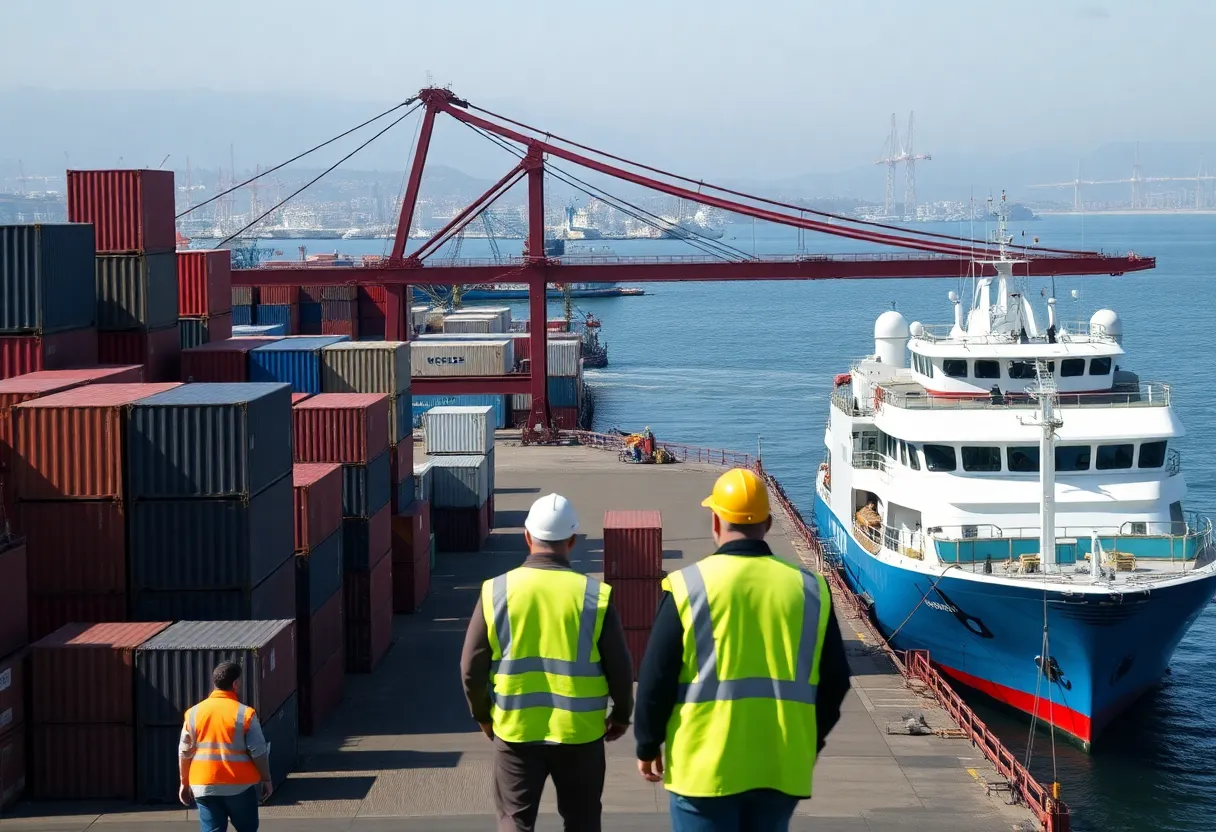News Summary
California’s ports are experiencing a significant decline in activity due to tariff policies initiated under President Trump. Reports indicate vessel call cancellations have surged at the Port of Long Beach and the Port of Los Angeles, reflecting challenges not even seen during the COVID-19 pandemic. Such decreases in port operations are jeopardizing the jobs of longshore workers and related industries. Experts warn that ongoing tariff uncertainty could lead to major job cuts and economic instability across the state, severely impacting small businesses and agricultural exports.
California is experiencing a sharp decline in port activity, attributed to the ongoing effects of tariff policies initiated under President Trump. The ripple effects of these tariffs have notably impacted container traffic, surpassing even the downturn seen during the COVID-19 pandemic.
Recent reports from the Port of Long Beach indicate that vessel call cancellations are currently exceeding those experienced during the height of the health crisis. The Port of Los Angeles initially anticipated 80 ship arrivals in May; however, as of now, 17 cancellations have already been logged, a significant increase from just 12 cancellations recorded during the same month last year.
In addition, the Port of Oakland reported a 15% drop in container activity in April, marking the most considerable decline of the year thus far, directly linked to tariff-related issues. The unpredictability surrounding tariffs has led to hesitance among businesses regarding imports, which has negatively impacted both cargo volume and job availability. This decrease in activity threatens the livelihoods of many, particularly longshore workers at California ports.
The workforce of the International Longshore Workers Union, which includes approximately 9,000 full-time and 6,000 part-time port workers, is feeling the effects of reduced port operations. Many full-time longshore workers are struggling to secure consistent work hours, with some not receiving the standard 40 hours a week, while part-time workers are facing the prospect of having no hours at all.
As port activity continues to decline, there are broader implications for the supply chain. Workers in related sectors—such as truck drivers, warehouse employees, and retail staff—are also experiencing decreased job security. Truck drivers affiliated with Teamsters Local 848 have reported uncertainty about their hours and income, further highlighting the cascading effects of diminished port activity.
Although there was a slight reduction in planned ship cancellations for June at the Port of Oakland, experts suggest that the long-term impacts of tariff policies will continue to strain port operations. California farmers are particularly facing challenges, as retaliatory tariffs have adversely affected exports of key products such as soybeans.
The situation is exacerbated by the fact that, prior to the implementation of the tariffs, Chinese imports made up 40% of shipments at the Port of Los Angeles and 63% at the Port of Long Beach. A potential trade deal with China was announced on May 12, aimed at temporarily lowering tariffs from 145% to 30% for a period of 90 days; however, significant uncertainty remains regarding the long-term outcomes.
The economic contributions of the Ports of Los Angeles and Long Beach to California’s economy are substantial, with job losses projected in connection to the declining import levels. Estimates suggest that a 10% decrease in cargo could result in a loss of about 100,000 jobs statewide. The impending threat of such job cuts is acute for communities in areas like Long Beach that depend heavily on port-related employment.
The current environment presents particularly significant challenges for small and medium-sized businesses that do not have the capacity to stockpile goods. Experts project that imports may drop by as much as 35% within a fortnight following the implementation of the new tariff policies, raising further concerns about economic stability in the region.
Compounding these issues is the fact that agricultural shipments from California have sharply declined since March or have experienced significant reductions, contributing further to the overall decrease in cargo processed through state ports. Economic experts are warning that ongoing uncertainty regarding tariffs could severely impact business planning endeavors and lead to even more extensive job cuts across the California economy.
Deeper Dive: News & Info About This Topic
- Los Angeles Times: Ports of LA and Long Beach Tariff Pressers
- The Guardian: Los Angeles Ports and Trump Tariffs
- Reuters: Shipping Volume Will Plummet 35% Next Week, LA Port Official Says
- CNBC: Busiest US Ports See Big Drop in Chinese Freight Vessel Traffic
- NBC Los Angeles: Ports of Los Angeles and Long Beach 44% Drop in Docked Vessels
- Wikipedia: Trade Tariffs
- Google Search: California ports tariff impact
- Google Scholar: California ports economy
- Encyclopedia Britannica: U.S. Trade Policy
- Google News: California port jobs

Author: STAFF HERE COSTA MESA WRITER
The COSTA MESA STAFF WRITER represents the experienced team at HERECostaMesa.com, your go-to source for actionable local news and information in Costa Mesa, Orange County, and beyond. Specializing in "news you can use," we cover essential topics like product reviews for personal and business needs, local business directories, politics, real estate trends, neighborhood insights, and state news affecting the area—with deep expertise drawn from years of dedicated reporting and strong community input, including local press releases and business updates. We deliver top reporting on high-value events such as the OC Fair, Concerts in the Park, and Fish Fry. Our coverage extends to key organizations like the Costa Mesa Chamber of Commerce and Boys & Girls Clubs of Central Orange Coast, plus leading businesses in retail, fashion, and technology that power the local economy such as Vans, Experian, and South Coast Plaza. As part of the broader HERE network, including HEREAnaheim.com, HEREBeverlyHills.com, HERECoronado.com, HEREHollywood.com, HEREHuntingtonBeach.com, HERELongBeach.com, HERELosAngeles.com, HEREMissionViejo.com, HERESanDiego.com, and HERESantaAna.com, we provide comprehensive, credible insights into California's dynamic landscape.


